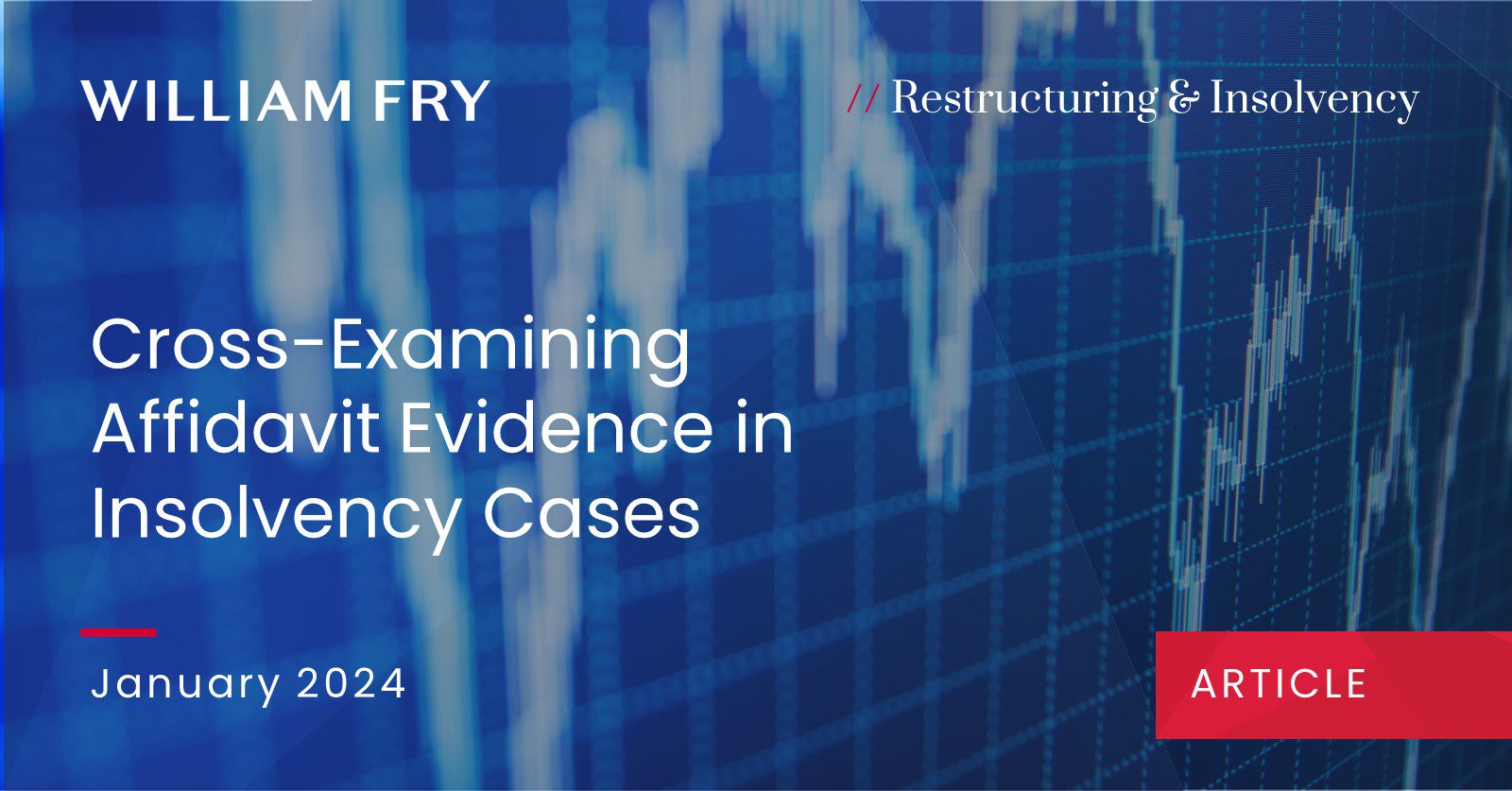The High Court (Court) recently dismissed a petition seeking the winding up of a biofuel company (Company).
The ex tempore judgment is of note because it considers the standing of the Petitioner to bring the application and the consequences of a relevant witness not being cross-examined by the Petitioner on his affidavit evidence regarding the solvency of the Company.
Background
Provisional liquidators were appointed to the Company in November 2023. The contested liquidation application was heard by the Court in December 2023.
The Petitioner applied for the Company to be wound up because it was unable to pay its debts within the meaning of section 569(d) of the Companies Act 2014 (2014 Act). In support of its application, the Petitioner relied on section 570(d) of the 2014 Act, under which it must be proved to the court’s satisfaction that the company is unable to pay its debts, and in so deciding, the court must consider the contingent and prospective liabilities of the company.
The Petitioner owned 65% of the shares in the Company. Although it was a contributory of the Company for the purpose of section 571 of the 2014 Act, the Company relied on its status as a creditor to establish standing to present the petition. The Petitioner alleged it was owed over €40 million by the Company. The petition was supported by a customer of the Company who also alleged a significant debt was owed to it by the Company.
The Petitioner bore the onus of proving that the company was insolvent. The Company resisted the application on the basis that it was solvent.
The contested fact of insolvency
The evidence relevant to the Company’s ability to pay its debts was set out in affidavits.
The Company relied on affidavit evidence from an accountant who disputed the Petitioner’s allegation of the debt and alleged that when a claim in respect of Renewable Transport Fuel certificates was offset against monies owed to the Petitioner, the Company was actually a net creditor as regards the Petitioner. The Petitioner countered that the documents produced by the Company in support of this assertion were not credible or reliable and should be disregarded. In support of that position, the Petitioner referred to the Company’s management accounts which showed significant ongoing losses. There were also vastly different projections from the Company’s accountant where, as at August 2023, he projected negative asset balances, versus October 2023, when he asserted that the company was solvent.
Although the Petitioner disputed the evidence as being neither credible nor reliable, it did not seek to cross-examine the accountant.
Need for cross-examination
Where a party bears the onus of proof in establishing a contested fact in its favour, it must use all procedural measures open to it to ensure that the conflicting evidence is challenged. In cases involving affidavit evidence only, one such procedure is to cross-examine the deponent on their testimony.
Cross-examination of deponents on the contents of their affidavits is not an automatic entitlement open to parties; it requires the court’s permission. However, it will be allowed where necessary to ensure a fair trial where there are conflicting versions of facts. The Irish courts have held that a party who wishes to contradict affidavit evidence must serve a notice of intention to cross-examine (Boliden Tara Mines Ltd v Cosgrave [2010] IESC 62).
The Irish Supreme Court in RAS Medical Limited v Royal College of Surgeons of Ireland [2019] 1 IR 63, held that where documentary evidence casts doubt on the reliability of affidavit evidence, the Court cannot reject the sworn evidence in the affidavit on the basis that it is inconsistent with the documentary evidence without giving the relevant witness an opportunity, under cross-examination, to address matters that go to credibility or reliability.
In other words, affidavit evidence cannot be rejected in favour of other affidavits or documents, without allowing the deponent to address issues regarding the credibility of their sworn evidence.
Consequence of no cross-examination
The Court accepted that where there is a conflict of affidavit evidence, in certain circumstances it can have regard to other documents which would establish in a winding up petition that a company is unable to pay its debts (following Re Bayview Hotel (Waterville) Ltd [2022] IEHC 516). However, this was not such a case. The Petitioner had sought to rely on iterations of management accounts and financial projections to establish the Company’s insolvency, but the provenance of these documents was not clear.
Although acknowledging that the Company’s accountant would have difficulties in answering questions on his projections for the Company’s prospects and its ability to pay its debts, the Court held that it was not appropriate to disregard the accountant’s evidence when it had not been challenged in cross-examination.
In the absence of cross-examination, the Court held that it was inappropriate to conclude on the solvency of the Company. It dismissed the Petition because the Petitioner had not discharged its onus of establishing that the Company was unable to pay its debts.
Concluding thoughts
The judgment confirms that if a petitioner seeks to establish, based on affidavit evidence, that a company is unable to pay its debts for the purposes of section 570(d) of the 2014 Act, it must consider the possibility of cross-examination where there are conflicting affidavits. Otherwise, a petitioner may not succeed in discharging its evidential burden.
The judgment may result in an increase in parties seeking cross-examination of witnesses in petition hearings relying on section 570(d), which requires the petitioner to prove insolvency to the satisfaction of the court. Cross-examination in such cases is at present quite rare.
The case can be distinguished from one in which a petitioner avails of the 21-day demand procedure under section 570(a) of the 2014 Act, which (Sanfey J noted) would have forced the company to identify how it disputed the debt “in good faith and on substantial grounds”.
For more information or to discuss any aspect of this article in more detail please contact Fergus Doorly, Ruairi Rynn or Barbara Galvin or any member of our Restructuring & Insolvency team.
Green D Project Ireland Ltd v Companies Act
Contributed by Gail Nohilly




